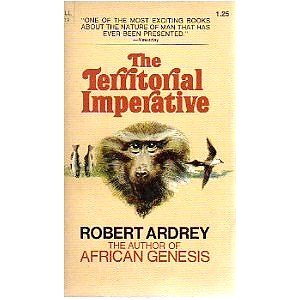Territorial Imperative: Difference between revisions
m (Text replacement - "{{Page-ok|11/20}}" to "") |
m (Text replacement - "ASIN" to "asin") |
||
| (3 intermediate revisions by the same user not shown) | |||
| Line 1: | Line 1: | ||
{{Header| | {{Header|Territorial Imperative 03/22}} | ||
{{ | [[image:Territorial-Imp.jpg|right|thumb|{{bc|Territorial Imperative}}]] | ||
'''''Territorial Imperative''''' (aka: ''The Territorial Imperative A Personal Inquiry Into the Animal Origins of Property and Nations'' by [[Robert Ardrey]]. | |||
{{review|'A Customer'|Amazon.com}} | |||
Who are human beings? What they are? How do we deal with the reality of what human beings are? Anyone who has ever put these and similar questions will read the book by [[Robert Ardrey]] with great interest. | |||
People are both biological and social beings, and these two natures are ineradicable in them. While human social life has become the subject of studies in the social sciences, human biology has become, to great degree, exclusively the subject of medicine. R. Ardrey's aim was to draw a bridge over the "no man's land" between the natural and social sciences, since in his own words, "no man or other animal lives as other as a whole thing." | |||
Ardrey | Attachment to a certain territory, which Ardrey has defined as the "territorial imperative", is a most deeply rooted feature of all living beings, from a worm to a human. R. Ardrey begins his book with the definition of this central notion: "A territory is an area of space, whether of water or earth or air, which an animal or group of animals defends as an exclusive preserve. The word is also used to describe the inward compulsion in animate beings to possess and defend such a space." Of course, the most inventive of animals - the human species - have extended their "territories" far beyond their apartments or garden plots to spheres of influence in business and politics, employment, etc. In the book by Robert Ardrey a reader will find answers and clues to the question: "Why do things happen in human everyday life and history as they happen and not according to the precepts of the most enlightened minds?" His answers are more informative than many volumes of writings about "man and society". | ||
;Product Details | |||
:Paperback | |||
:Publisher: A Delta Book; First Edition edition (1966) | |||
:Language: English | |||
:asin: B001Q8OAVA | |||
:Product Dimensions: 8.4 x 5.8 x 0.7 inches | |||
:Shipping Weight: 12.6 ounces | |||
{{cat|Books}} | |||
{{Ardrey}} | |||
{{Anthropology}} | {{Anthropology}} | ||
{{footer}} | {{footer}} | ||
{{cat|Reference Library|books}} | {{cat|Reference Library|books}} | ||
Latest revision as of 10:54, 5 September 2022
Territorial Imperative (aka: The Territorial Imperative A Personal Inquiry Into the Animal Origins of Property and Nations by Robert Ardrey.
|
Who are human beings? What they are? How do we deal with the reality of what human beings are? Anyone who has ever put these and similar questions will read the book by Robert Ardrey with great interest.
People are both biological and social beings, and these two natures are ineradicable in them. While human social life has become the subject of studies in the social sciences, human biology has become, to great degree, exclusively the subject of medicine. R. Ardrey's aim was to draw a bridge over the "no man's land" between the natural and social sciences, since in his own words, "no man or other animal lives as other as a whole thing."
Attachment to a certain territory, which Ardrey has defined as the "territorial imperative", is a most deeply rooted feature of all living beings, from a worm to a human. R. Ardrey begins his book with the definition of this central notion: "A territory is an area of space, whether of water or earth or air, which an animal or group of animals defends as an exclusive preserve. The word is also used to describe the inward compulsion in animate beings to possess and defend such a space." Of course, the most inventive of animals - the human species - have extended their "territories" far beyond their apartments or garden plots to spheres of influence in business and politics, employment, etc. In the book by Robert Ardrey a reader will find answers and clues to the question: "Why do things happen in human everyday life and history as they happen and not according to the precepts of the most enlightened minds?" His answers are more informative than many volumes of writings about "man and society".
- Product Details
- Paperback
- Publisher: A Delta Book; First Edition edition (1966)
- Language: English
- asin: B001Q8OAVA
- Product Dimensions: 8.4 x 5.8 x 0.7 inches
- Shipping Weight: 12.6 ounces
|
Desmond Morris • The Naked Ape • The Human Zoo |
Chat rooms • What links here • Copyright info • Contact information • Category:Root
